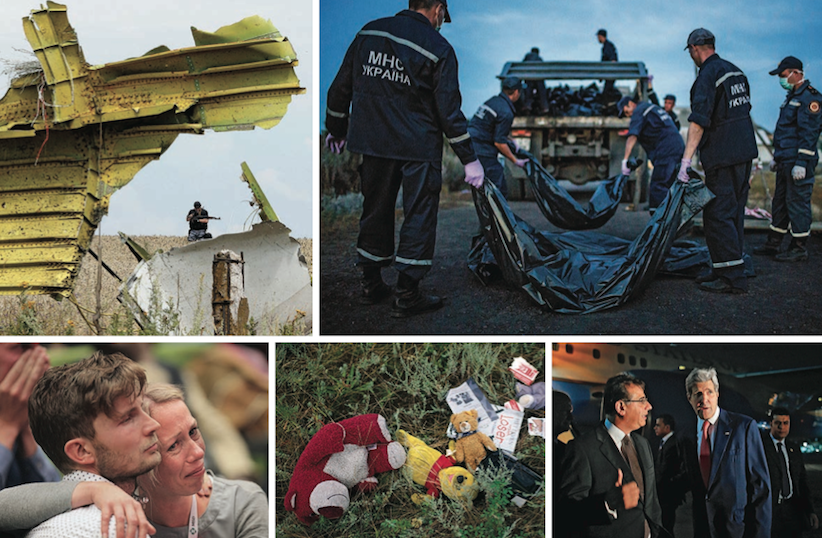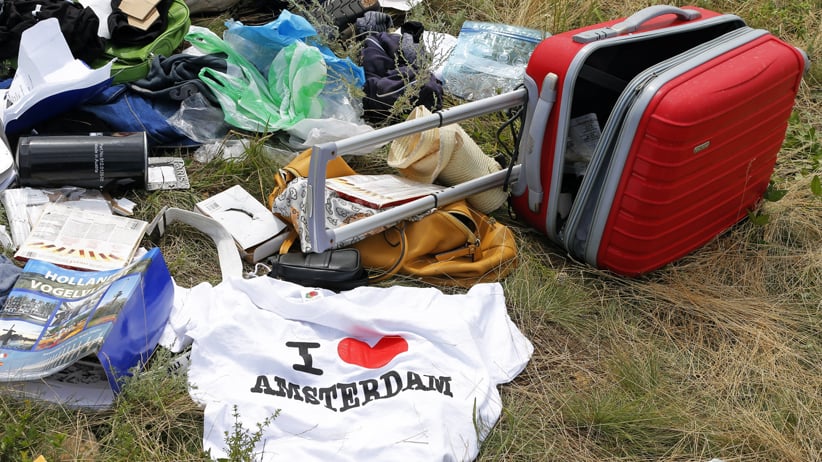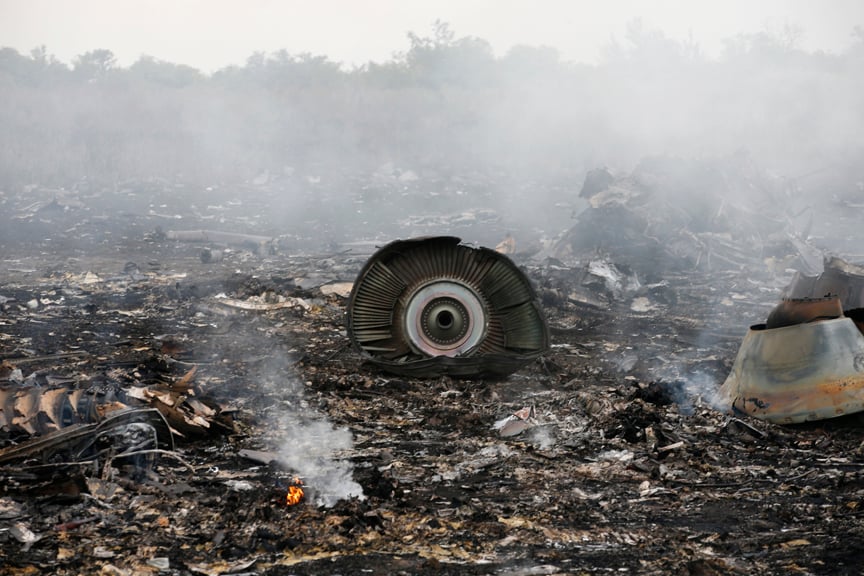Is Putin getting away with murder?
Why even the condemnation that’s followed the downing of Flight MH17 won’t slow Putin’s ambitions.
Russia’s President Vladimir Putin attends a ceremony to award researchers and explorers of the Antarctic continent, in St. Petersburg, June 5, 2014. REUTERS/Alexei Nikolsky/RIA Novosti/Kremlin
Share

Faced with escalating Russian aggression in Ukraine, American Secretary of State John Kerry warned Moscow of a “very serious” response from the United States and Europe. German Chancellor Angela Merkel similarly told Russia it risked “massive” consequences.
Those threats were uttered not following the downing of Malaysia Airlines Flight MH17 last week, almost certainly by Russian-backed separatists using a surface-to-air missile supplied by Moscow, but in March, as Russia prepared to formally annex the Ukrainian region of Crimea, which it had just invaded.
The warnings didn’t work. Russia staged a sham referendum and took over the territory, shredding an agreement it had signed in 1994 to uphold Ukraine’s territorial integrity in exchange for Ukraine giving up nuclear weapons. Russian President Vladimir Putin didn’t stop with Crimea. He sent Russian troops and intelligence agents into eastern Ukraine to stir up unrest there. With help from them and as they pretended—often poorly—to be local Ukrainians, they attacked government buildings and police stations. By April, they had declared a “Donetsk People’s Republic,” which they hoped to join to Russia. A civil war brewed as Ukrainian armed forces fought to regain territory the separatists had seized.
In recent weeks, evidence emerged that the separatists, or possibly their allies in Russia, were using sophisticated weaponry, including surface-to-air missiles. Several Ukrainian military planes have been shot down. One, a large transport plane flying near the Russian border, was hit at an altitude above the normal range of the shoulder-fired missiles of separatist fighters. Rebels claimed responsibility, but Ukraine’s defence minister said the missile might have been fired from Russian soil. The United States has alleged that just one convoy of 150 vehicles from Russia to rebels in eastern Ukraine this month contained tanks, armoured personnel carriers, artillery and rocket launchers. Kerry also said America had information that Russia is training separatist fighters on its soil, including on air defence systems.
As for the missile that took down MH17 and killed all 298 people on board, Kerry alleges that the U.S. intercepted conversations about the transfer of a Russian SA-11 radar-guided missile system to rebels in eastern Ukraine, and that the fatal missile was launched from an area controlled by separatists. “We picked up the imagery of this launch. We know its trajectory. We know where it came from,” he told NBC’s Meet the Press.
Ukraine has also released what it describes as audio of an intercepted phone call between rebels and Russian officers in which a rebel discusses shooting down the plane.
The atrocity was likely an accident, of sorts. Rebel leader Igor Strelkov, believed by Kyiv to be a Russian army intelligence agent, posted a tweet bragging about shooting down the plane, which he thought was an Antonov An-26 transport aircraft of the type that had already been shot down over eastern Ukraine earlier this month. “We warned you—do not fly in our sky,” he said, before removing the tweet when it emerged the rebels had, in fact, killed almost 300 civilians.
But America’s rhetorical response to Russia’s alleged complicity in mass murder sounds a lot like it did when faced with Russia’s takeover of Crimea. “This is the moment of truth for Russia,” Kerry said on Sunday.
Putin might be forgiven for scoffing. “Words of outrage have never been anything that the Soviet or Russian leadership takes seriously,” says Keir Giles, an associate fellow at Chatham House, a think tank in London. And for months, the West’s response to ever-increasing Russian aggression in Ukraine has been diplomatic isolation and sanctions that are consequential but not crippling. Russian money still fuels London’s financial district. Germany still runs on Russian gas. France still plans to supply Russia with two high-end Mistral-class amphibious assault ships. Italy sells its luxury goods in Russia and has tried to bolster its fragile economy with Russian investment.
Russia’s annexation of Crimea didn’t fundamentally change these relationships. And if redrawing the borders of Europe by force drew only absorbable punishment, Putin might wonder why the downing of a commercial airliner should provoke anything more serious.

Related post: What remains of the lives lost on Malaysia Airlines MH17
People have been dying for months as a result of Russian aggression in Ukraine. But this latest tragedy has internationalized the conflict, and brought it to the heart of Europe. Of the 298 victims aboard MH17, 193 were from the Netherlands, a member state of the European Union. Forty-three were from Malaysia. Twenty-seven were Australian. One was Canadian: 24-year-old student Andrei Anghel. The dead include some 80 children. It was a spectacular act of mass murder that had refocused attention on Russia’s intervention in Ukraine, and on what the West might do to end it.
“The United States and Europe do not have a way to directly affect the calculations of separatists in eastern Ukraine, so the target has to be Moscow,” says Steven Pifer, a senior fellow at the Brookings Institution and a former American ambassador to Ukraine. “What you want to do is press the Russians, first and foremost, to cut the supply of weapons that is going into eastern Ukraine and is sustaining this conflict, and then get Moscow to press the separatists to stop fighting.”
Canadian Prime Minister Stephen Harper released a statement on Monday that Canada would be imposing new sanctions on Russia. A government source told Maclean’s that Ottawa is moving toward sanctions that would hit entire sections of the Russian economy. Canada has already targeted 110 individuals and entities. Like the United States, it has sanctioned members of Putin’s inner circle—a tactic Giles describes as effective because it affects the “decision-making cronies” who surround and influence Putin.
Canada and the United States, in part because their economies are more sheltered from financial turmoil in Russia, have taken a generally firmer position against Moscow than have most European nations. But even America’s response to Russian intervention in Ukraine has been mild, according to Pifer.
“I would have liked to have seen the administration apply more robust sanctions earlier—and if it was not going to be applying more robust sanctions, not talk about it so much, because they gave the impression that they were creating red lines. And then, when the Russians crossed the line, not doing anything.”
Pifer says America’s position is hardening. Earlier this month, before MH17 was shot down, it expanded its sanctions to include Gazprombank, the third-largest bank in Russia, as well as defence and energy firms, including Rosneft, an oil company owned by the Russian government. “The problem in Washington is they don’t want to get too far ahead of the Europeans and create a situation in which the Russians can play the Europeans off of the United States”—exposing divisions among countries allied against Russia, says Pifer.

The European Union, meanwhile, is trying to build consensus on how to respond to the attack. EU foreign ministers met in Brussels on Tuesday and announced they would also expand sanctions against Russian individuals and organizations. They didn’t release details, but said Europe would prepare “proposals for taking action, including on access to capital markets, defence, dual-use goods, and sensitive technologies, including in the energy sector.”
But already there are signs of splits within Europe. British Prime Minister David Cameron said there is “reluctance” among some European counties to forcefully confront Russia. He is pushing his fellow EU members to impose restrictions on Russian banks and airlines, and asset freezes on Putin’s backers. He’s also called on Europe to stop arms sales to Russia—a position backed by Lithuania. And Cameron has described France’s planned delivery of the amphibious assault ships as “unthinkable” in light of the attack on MH17.
French President François Hollande said the first of the two ships will be delivered by October, and that no sanctions are in place that would compel France to abandon the rest of the contract. “We’ll see if the Russians behave badly,” he said—though what exactly would constitute bad behaviour in French eyes that Russia hasn’t already engaged in is hard to fathom.
Jean-Christophe Cambadélis, head of the ruling Socialist party and an ally of Hollande, called Cameron a “hypocrite” with no right to scold France about its military deals with Russia. “When you see how many [Russian] oligarchs have sought refuge in London, David Cameron should start by cleaning up his own backyard,” he said.
Cambadélis has a point—or at least, he did. In March, a senior British official was photographed carrying a document that said Britain should not, “for now,” close the city of London, Britain’s financial hub, to Russian investors. British Chancellor George Osborne has more recently warned Britain that it may pay a short-term financial price if tougher sanctions are imposed on Russia, but that such measures may be necessary for the stability and security of Europe.
The difficulty for the European Union, when it comes to formulating its foreign policy, is that it is not a unified state with common goals and interests. “It’s a 28-member, consensus-based, decision-making [organization],” says Orysia Lutsevych, a research fellow at Chatham House.
“All of these counties have different sympathies and affinities and economic links with Russia. We have countries like Italy, which is very much against any kind of sanctions. We have big lobbying companies in Germany trying to say it would be a very negative impact on the German economy. It’s exactly why Putin’s strategy of dividing the European Union is working.”
The uncomfortable reality for Europe is that any measures it might take that are sufficiently powerful to have a chance of influencing Putin are likely to damage Europe, as well.
The French deal to supply Russia with the amphibious assault ships is a telling example. The contract is worth more than $1.5 billion, and cancelling or delaying it would likely jeopardize future weapons deals. Of course, France is reluctant to do so. But the European Union has also signed an association agreement with Ukraine. It is bound to it—not in the same way that NATO or EU member states are bound to each other—but, nevertheless, an EU member state cannot credibly arm a country that is invading one of Europe’s economic partners without cheapening the values for which Europe supposedly stands.
There are also practical reasons to pressure Russia to rein in Ukraine’s separatists. Ukraine exists on the borders of the European Union. “If Europe is just about money, then they will turn their eyes from this. But then, they may be surprised next week about what kind of neighbour they have,” says Pifer.
“My concern is, if the Europeans aren’t prepared to crank up pressure, then Mr. Putin concludes that he can get away with business as usual, and you’re going to see a lot more weapons flow into eastern Ukraine. The dead may not be Dutch or Australians, but there’s going to be a lot more dead.”
Russia, in other words, is unlikely to stop fuelling conflict in eastern Ukraine unless Putin feels the costs of doing so are more than he can bear. Already this year, capital worth more than $75 billion has left Russia. This does not appear to have weakened Putin’s defiance. But, short of more powerful sanctions, the West doesn’t have a lot of options.
Markos Kounalakis, a visiting fellow at the Hoover Institution, argues that the U.S. should designate Russia as a state sponsor of terrorism. He says it would politically isolate Putin, but he doesn’t think it’s likely to happen. And according to Pifer, any pressure the West applies on Putin should also leave him with the opportunity to change course. Designating Russia as a sponsor of terrorism, or even sanctioning Putin as an individual, may leave Putin feeling cornered.
It’s also unlikely that Putin will feel any push to change from the broader Russian population. Among most Russians, the accepted narrative is that Putin has stood up to Russia’s enemies and won, reclaiming Crimea from the fascists who had taken power in Kyiv, and now defying NATO and Europe on Russia’s Ukrainian doorstep. “It boosts his popularity, because he’s giving the evil terrorist Ukrainians a hard time,” says Giles, speaking of the dispute between Ukraine and Russia over who is responsible for the attack on MH17.
“By all appearances, Putin’s popularity seems to be sky-high,” adds Pifer. “A lot of this is because Russian public opinion is shaped by Russian media.” Most Russian media, especially television, are controlled by the state or by individuals close to Russia’s leadership. Coverage of MH17’s downing has featured a variety of theories to explain the crash—including that Ukraine was trying to assassinate Putin, who was supposedly flying nearby, but missed; and that a Ukrainian military fighter shot the jetliner down with the help of an American spy satellite. “The domestic media picture that you get in Russia is just so utterly alien to what we know to be the facts on the ground,” says Giles. “You just have to reverse every assumption.”
Ukraine, for Putin, is not a minor geopolitical issue on which he will easily cede ground. He risked war by invading Crimea. He’s shown little inclination to back down in eastern Ukraine. If Ukraine insists on tilting westward, toward Europe, Putin wants to make sure it is weak and unstable, and he’ll keep a war burning in Ukraine to accomplish that. Convincing him to reverse this policy may not be possible. But if it is, it will probably require the sort of sanctions and financial pressure that will take a toll on those targeting Russia, as well.
Kerry was only half right when he said this is a moment of truth for Russia. It’s also a moment of truth for Europe.